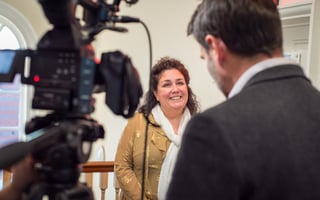Often at this time of year, our media training blog focuses on the word of the year.
If I had to name a journalist that I would be reluctant to face, Nick Ferrari would be right up there.
The LBC presenter has a pretty ferocious reputation and has posed the forensic questions that have led spokespeople to produce some recent memorable media interview disasters.
Just think of the damage done by some of his interviews, such as those with Dianne Abbott and Natalie Bennett.
So, it was interesting to see one spokesperson face him on a potentially challenging subject last week and do more than just survive the encounter.
When Mr Ferrari confronted university union boss Dr Jo Grady over 14 days of strikes that are set to affect more than one million students, I expected it to be particularly tough.
And an opening question of ‘why make the students suffer’ suggested I would be proved right.
But Dr Grady stood up to the challenge and produced a strong performance in an interview which you can watch here.
Here’s how she handled that opening question:
“I think universities need to ask themselves that question because we have been constantly trying to have talks with them to resolve these issues. We have been left in a position where we have no other option but to withdraw our labour.”
When Mr Ferrari suggested that they weren’t being ‘forced to withdraw their labour, she replied: “I think if someone was presenting you with the option of losing £240,000 from your pension and therefore your retirement over that period and you have exhausted all talks you might consider withdrawing your labour too.
The tricky questions continued with the presenter suggesting that three university strikes in three years was ‘quite a lot’ and moving the conversation on to the average salary of a professor or lecturer.
Arguably the best response came to a question that suggested the strikes were “inconveniencing, possibly in part running the chances of so many students.”
Dr Grady responded: “What’s really interesting about these disputes is that even the students who have launched petitions to ask for rebates from universities, they’re also fully supportive of staff.
“The two are not in contradiction. What students know is that investment in staff is investment in students and leadership teams need to account for how they are poorly managing their institutions.”
There was even a good sound bite in response to the final question about whether this would be the final strike, with Dr Grady saying management “talk to us when we’re on the pickets and ignore us the rest of the time.”
Whatever your views on the strike, it would be difficult to not be impressed with this interview performance.
What stood out for me was the calmness. Many spokespeople get rattled and struggle to hide their anger and frustration when faced with confrontational and hostile questions and we’ve highlighted plenty of examples of that in this media training blog.
It tells the journalist they have found their mark and typically results in the interview becoming memorable for the wrong reasons and messages failing to land.
There was only one slight hint of frustration in this exchange when Dr Grady responded to a question about the average salary of a professor or lecturer as being “a really misleading version of what is happening in universities.”
Mr Ferrari immediately seized on this saying he had “just asked for a figure”, presenting the interviewee as being defensive and evasive.
What else was good about the interview?
Well, on our media training courses, we stress the importance of spokespeople not just answering the question, but also using their responses to try and steer and take control of the conversation. And there were clearly attempts to do that here.
Many spokespeople would also have fallen into the trap of repeating the negative language in the journalist’s question to rebut it. For example, when faced with a question like ‘why make the students suffer’, a spokesperson could easily fall into the trap of beginning their response with “I wouldn’t say we are making students suffer” or “I wouldn’t agree that we are making students suffer.” And that approach creates a nice soundbite of you using that negative language.
It is also worth saying that Dr Grady sounded like she knew what to expect from this interview and that comes from good preparation. We tell delegates on our media training courses that they need to do their homework on the journalist they will be speaking to and the outlet they work for.
Some journalists have reputations for being much more hard-hitting than others while some outlets are known to look for certain angles in stories.
Could you handle a hostile interview like this one? Our media interview preparation eBook will show you how to anticipate and prepare for those challenging questions.
Media First are media and communications training specialists with over 30 years of experience. We have a team of trainers, each with decades of experience working as journalists, presenters, communications coaches and media trainers.
Click here to find out more about our journalist led media training courses.
Subscribe here to be among the first to receive our blogs.




